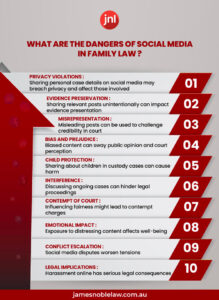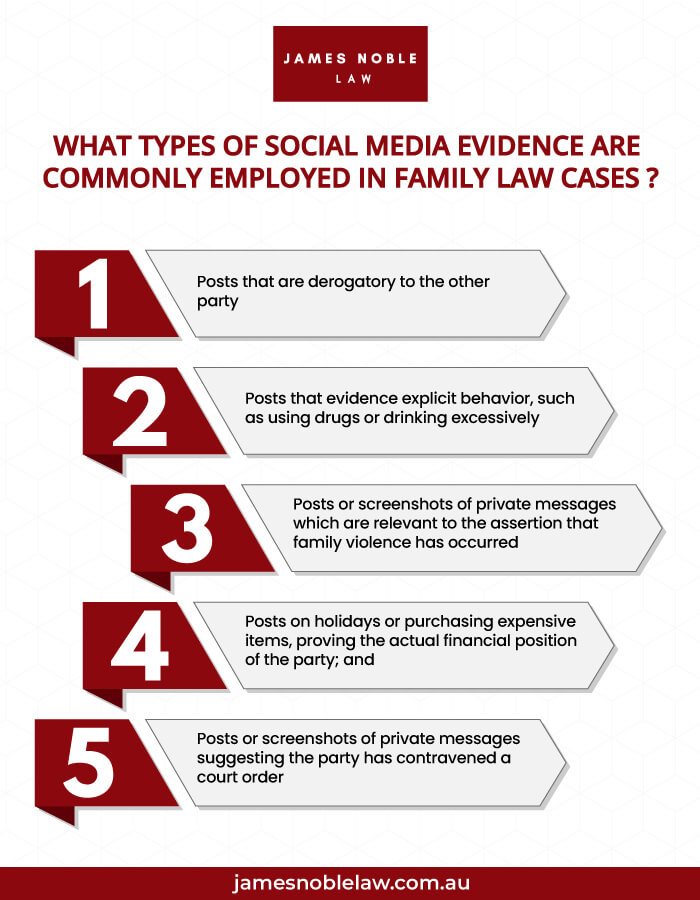
Dangers of Social Media
 The rise of social media is impacting various areas of law, particularly family law proceedings.
The rise of social media is impacting various areas of law, particularly family law proceedings.
While sharing a social media post may seem harmless, a recent Family Law Review found that 81% of cases accepted social media evidence.
There is no denying that an impulsive post can seriously affect the outcome of your matter.
The dangers of social media in the context of family law proceedings cannot be overstated. Posts, photos, and comments made in the heat of the moment can be used as evidence against you, potentially damaging your case. Privacy settings may not provide sufficient protection, as content can still be accessed or screenshotted.
Misinterpretation of posts is common, leading to misunderstandings that may exacerbate conflicts.
Moreover, social media can be a source of harassment, stalking, or defamation, further complicating legal matters. It is crucial for individuals involved in family law cases to exercise caution, think before they post, and seek legal advice on managing their online presence to safeguard their interests.
What Type of Social Media Evidence is Used?

Family law matters may use the following types of social media evidence:
- Posts that are derogatory to the other party;
- Posts that evidence explicit behavior, such as using drugs or drinking excessively;
- Posts or screenshots of private messages which are relevant to the assertion that family violence has occurred;
- Posts on holidays or purchasing expensive items, proving the actual financial position of the party; and
- Posts or screenshots of private messages suggesting the party has contravened a court order.
So, how might this apply to a real-life example?
In Reiby & Meadowbank [2013] FCCA 2040, the father’s bad behavior with drugs and alcohol presented in his social media posts was used as proof of his unsuitability to the parent. The mother in Edwards & Granger and Anor [2013] FamCA 918 was fearful of the father, presenting evidence of repeated threats to her life on Facebook. These scenarios prove that acting irresponsibly or violently will undoubtedly be used as evidence.
Does the Law Apply to Social Media?
Section 121 of the Family Law Act 1975 expressly prohibits parties from posting any part of a family law proceeding on social media. This includes any post which identifies:
- A party to the proceedings;
- A party who is related to a party to the proceedings; or
- A witness to the proceedings.
In addition to adversely affecting the outcome of your matter, breaching this law carries a penalty of 12 months imprisonment.
Can You Protect Yourself?
Change Your Passwords
It is important to ensure that your ex-partner does not have access to your social media accounts. To be safe, it is recommended that you reset any passwords.
Think Before You Click

You should always make social media posts with the assumption that they will be reviewed by the court. Ensure that your posts are always appropriate and tasteful. Avoid sharing any information about your ex-partner and avoid sharing posts that overly display your lifestyle. It may be a good idea to ask your friends and family members to avoid tagging you in any social media posts.
Avoid Deleting Posts
It is no surprise that nothing can actually be deleted off the internet. Before deleting a post, consider the possibility that a family member or friend may have already sent it to your ex-partner. Tampering with evidence is a serious offense.
How Can You Speak to a Lawyer?
The team at James Noble Law is experienced in the impact social media can have on family law disputes. If you are concerned about what evidence could be used against you, contact Brisbane family lawyers team to book a free consultation today. No-obligation 20-minute consultation. To schedule an appointment with one of our Qualified and experienced and Best Family lawyers Brisbane.
Find Brisbane family lawyers on Google Maps near you.
Helpful Family Law Documents & Guides
- A Guide to Children Negotiation and Family Law
- A Guide to Property & Family Law Act Paper
- A Guide to Alternative Dispute Resolutions
- A Guide to Preparing for the unthinkable
- A Guide to Collaborative Practice Paper
- A Guide to Separation in Family Law
- A Guide to Family Law Property
- A Guide to Dispute Resolution
- A-Z Collaborative Law eBook
- A Guide to Separation
- A Guide to Children
- Arbitration eBook


